The Battle of the Milvian Bridge
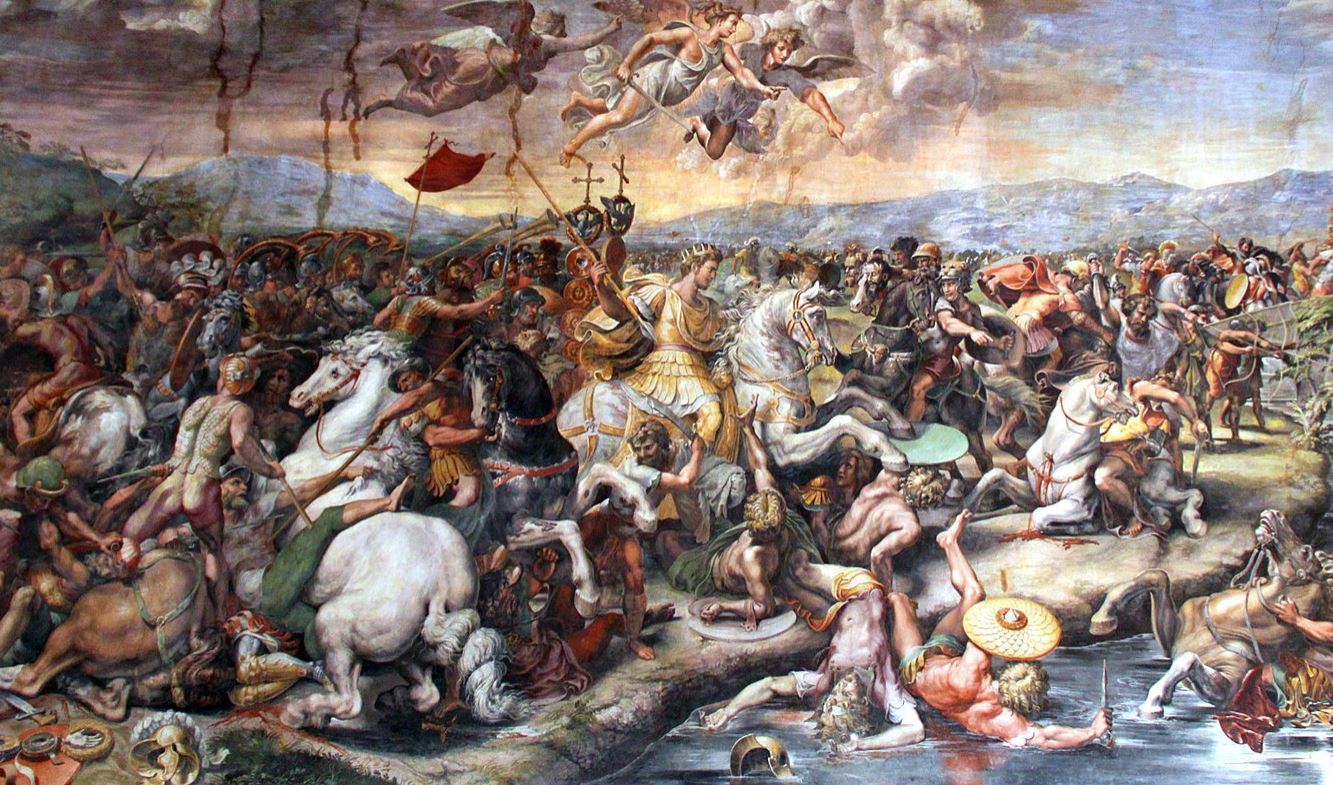


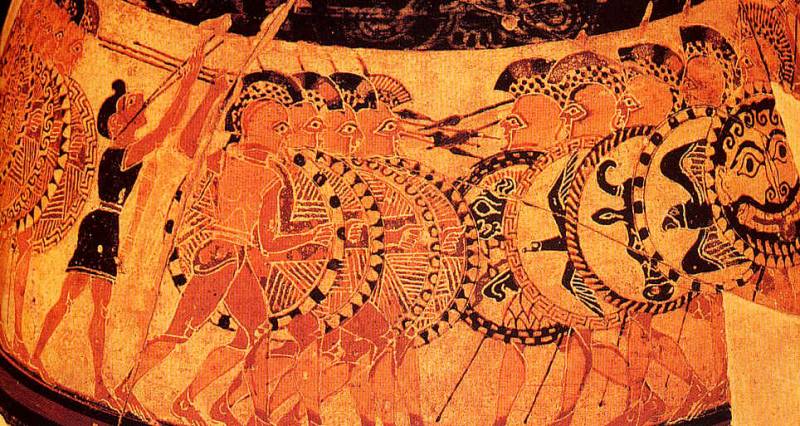
“One against one, they are as good as anyone in the world. For though they are free men, they are not entirely free. They accept the law as their master. And they respect this master more than your subjects respect you. Whatever he commands, they do. And his command never changes. It forbids them to flee in battle, whatever the number of their foes. He requires them to stand firm — to conquer or die.”
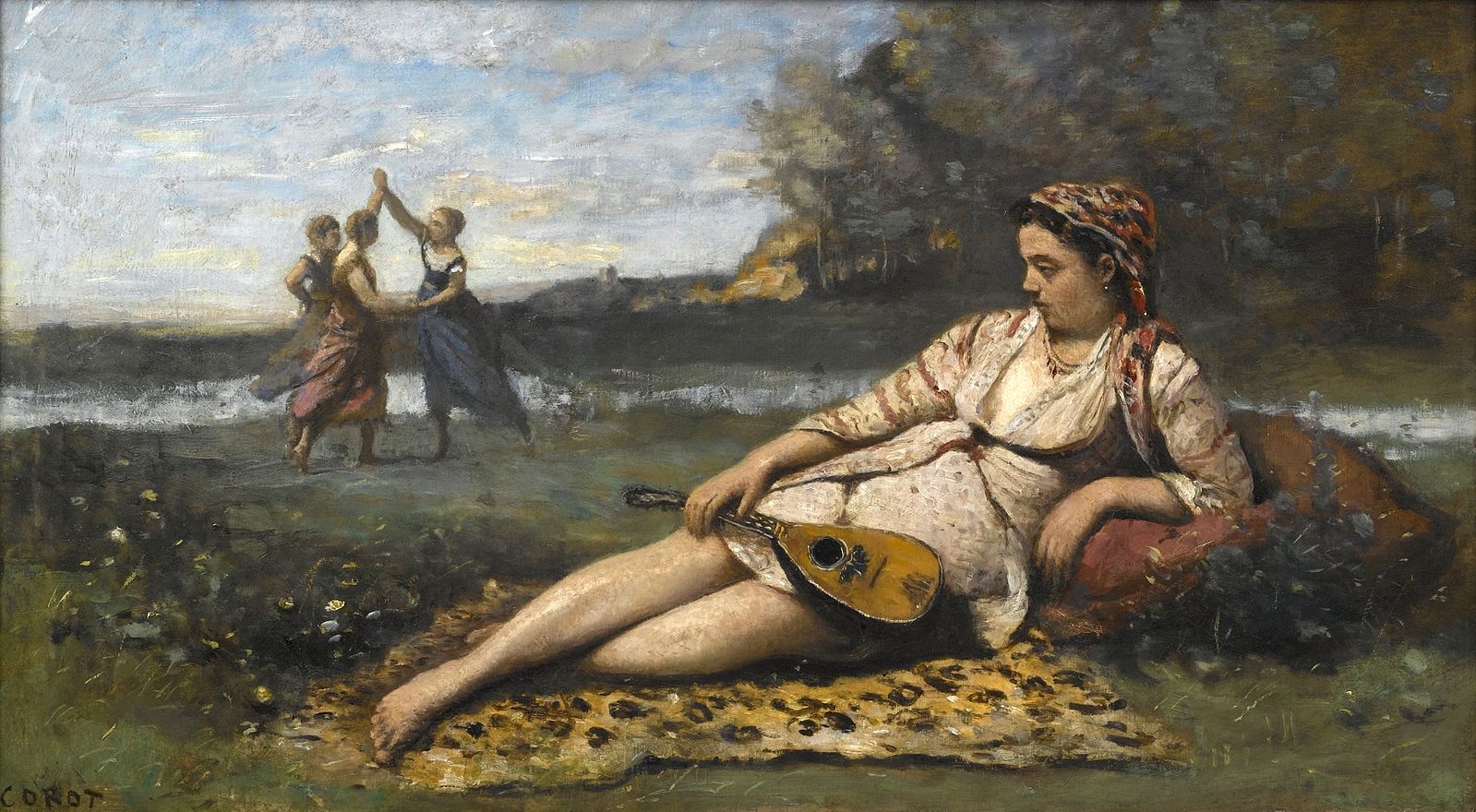
Written by Meghan McKenna, Contributing Writer, Classical Wisdom
Sparta, home of Ancient Greece’s most brutal warriors, trained from their youths to become capable hoplites. It is an image that has become a staple of our thoughts when thinking about how Spartan society may have been. But is this the case or is this a force-fed misconception due to centuries of misrepresentation? Was Spartan society as militarized as it is portrayed?
The Spartan Mirage
The first person to consider this and put it into writing was Francis Olliers in the 1930s. He discussed how certain philosophers may have set a precedent of a militaristic Sparta which continued to color opinion through the centuries.
Xenophon
Xenophon preferred the Spartan way of life and lived in Sparta for many years. Often, his praise of Spartan life is used to support the idea of Sparta as a heavily militaristic society, and his decision to live there gives credibility to this.
However, not all of Xenophon’s’ writing is considered when creating a picture of a militarised Sparta. In the Constitution of the Lacedaemonians, Xenophon writes an in-depth analysis of Spartan society, with the first thirteen chapters showing him praising the way Spartans raise their children, Spartan egalitarianism, and their warrior mindset.
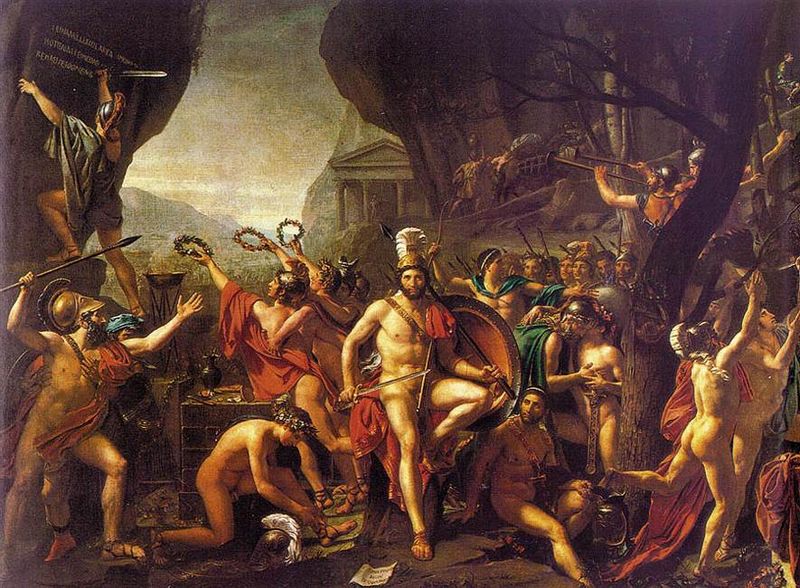
Leonidas at Thermopylae, by Jacques Louis David, 1814. This is a juxtaposition of various historical and legendary elements from the Battle of Thermopylae.
In his final chapters, Xenophon flips his view, explaining that everything that had made Sparta a great city-state was disappearing, as the state became corrupt and no longer followed the laws set by Lycurgus. He further discusses how there was a decrease in morals and prestige, which made other city-states suspicious and cautious of Sparta gaining more power and taking control of Greece.
Herodotus
Herodotus also contributed to the mirage, as his writing can be quite hyperbolic. For example, Herodotus gives historians a notion of the size of Sparta’s population, while also pushing the idea of military supremacy. At one point he describes Sparta as a city of about eight thousand men, “all of them equal to those who have fought [at Thermopylae].”
Plutarch
Plutarch also perpetuates the Spartan mirage, as he writes based on the oral history of Sparta 500 years after its prime. It was Plutarch’s writings that created the famous Spartan phrase, with your shield or on it.
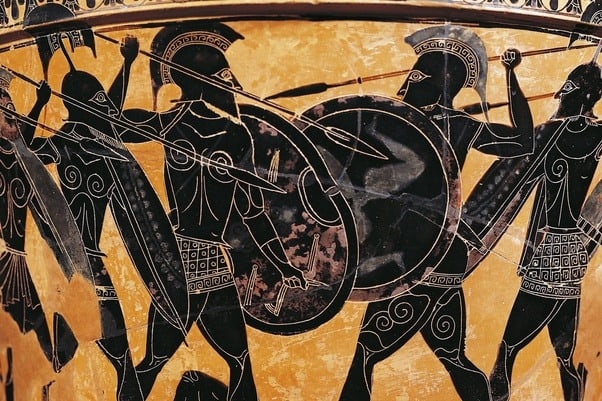
Spartan Warriors on Greek Vase. Google Images
Davies suggests that Plutarch’s writings are idealized, and states that even though Plutarch may have visited Sparta, it wouldn’t have resembled classical Sparta, as it had become “a tourist attraction which made a superficial claim to continuity with its glorious forebear.”
The way in which these classical writers contributed to the mirage is the most important explanation of how the image of a Spartan warrior state has become so widely accepted, not only in our own society, with movies such as 300, but also in other societies due to a snowball effect that began in Ancient Greece itself.
Agōgē
The agōgē is a unique part of Spartan society and was believed to be an education system. Boys would start at the age of seven, teaching them obedience and endurance. Xenophon explains that the staff, known as Mastigophoroi, would carry whips and the boys would wear the same shoes and clothes all year round and would be forced to train on little food, to encourage year-round endurance of the elements and the ability to continue when no food is available.

Young Spartans Exercising, by Edgar Degas, c1860, displayed in The National Gallery, London.
Many people would take this and instantly connect it to war. However, there is very little in Xenophon’s writing which actually points towards it being a military institution. Jean Ducat suggests that the agōgē may be overemphasized by historians due to its sensational nature and the fact that there is nothing similar to it in other poleis.
But surely military training from a young age would be both sensational and unusual, so why is it missing from other contemporary accounts?
Xenophon later discusses the Spartan formation in the army claiming that it is very easy to follow. Therefore, boys may not even need to have military training, and it is more beneficial to train them to be more formidable and steadfast, which would also come into practice during a harsh winter.
Hodkinson argues that we can make sense of the Spartan education system by putting the upbringing the Spartiate boys had into perspective. As his example, he states: “its commencement at age 7 and its division into three general stages—the paides (age 7–c.13), paidiskoi (age c.14–19) and hēbōntes (age 20–29)—parallels the less formalized stages of boyhood, youth, and young manhood in other poleis.”
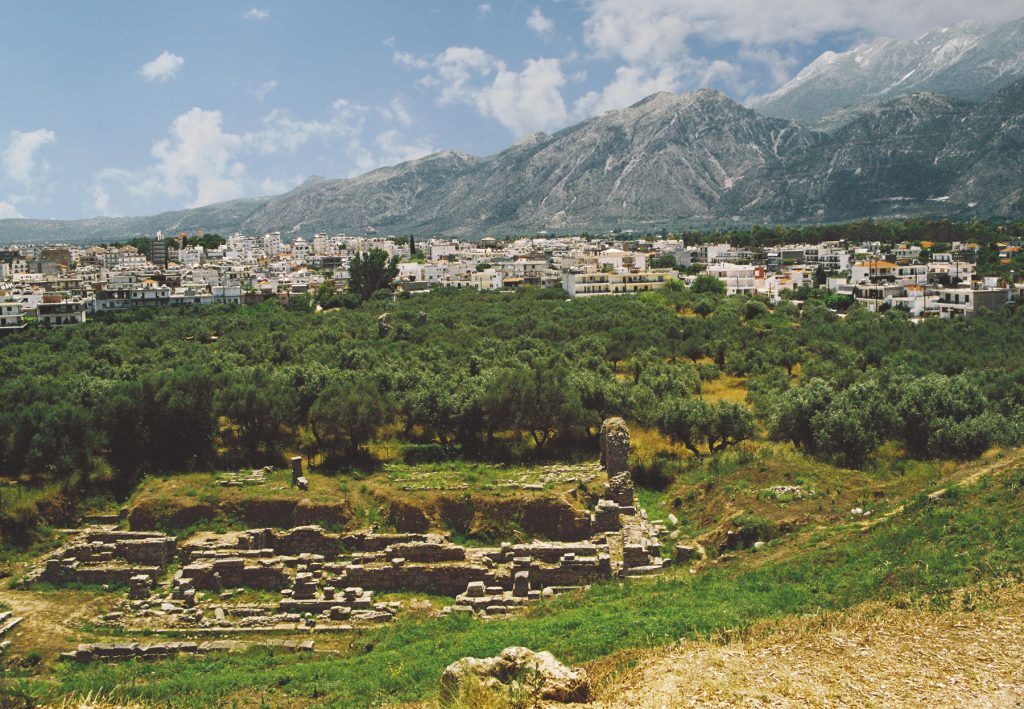
Ruins of Sparta from the right bank of the Eurotas. Sparti, Peloponnese, Greece.
Jean Ducat also argues that it is likely that boys had a normal upbringing with private tutors. However, this is not focused on by the ancient writers, as the agōgē is “the most sensational part, certainly … but not necessarily the most important.” So it seems that the agōgē was a highly disciplined education system overseeing a boy’s stages to manhood, rather than a highly militarized training establishment.
Structure
Sparta was run with an oligarchical government who had put in place a rigidly hierarchical societal system, which depended on the smooth operation of various state functions and infrastructure. Spartan society would have likely had a plethora of administrative positions entrusted solely to Spartiates, meaning there would have been plenty of nonmilitary jobs and responsibilities available, suggesting that there was more to Sparta than her military.
Although all men were expected to be a part of the military, at the age of thirty adult men were no longer active members. Moreover, many of them would have been injured in wars and no longer have been able to conduct military service. Are we to think that these men did nothing during their time away from the military?

Warriors. Side B from an Attic black-figure amphora, ca. 570–565 BC.
Well, we would be wrong…
All families in Sparta had a kleros, an estate that financially supported their family financially, with helots working the land. Managing the kleros and the accounts were the man’s responsibility. The household would receive barley from the government each year, and the man was expected to pay syssitia fees.
There was a system in place to receive and acknowledge these payments, which employed Spartiate men who were either too old to campaign or injured. Once again, we see that there were roles in Spartan society that were nonmilitarized.
Military practices
As previously mentioned, Xenophon discussed the seemingly difficult maneuvers conducted by the Spartan army during battle as being “so easy to understand that no one… can possibly go wrong.” He also mentioned that the men are led by “second lieutenants” who verbally give out orders—orders that other poleis do not give.
Though it is often thought that the Spartan military was highly trained and militarised, in reality, they just employed tactics that were not complicated and worked being given by lieutenants who could control large groups of men.
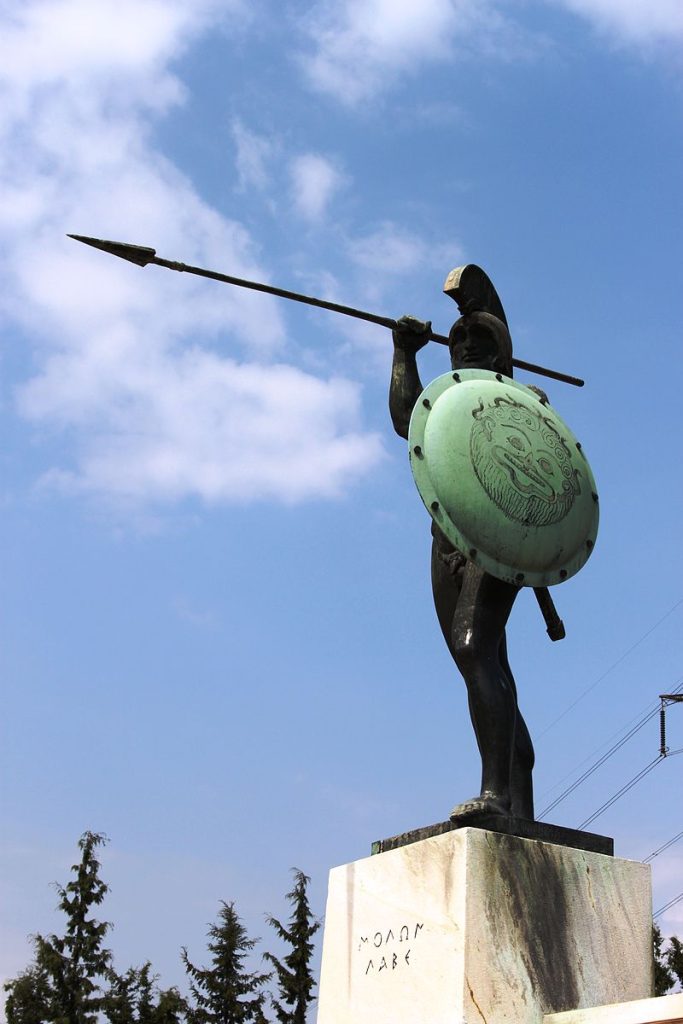
On the monument to the Battle of Thermopylae, Leonidas.
If we consider Sparta in comparison to other city-states or countries at the time, its military isn’t very impressive in size. In terms of size, Athens’ military consisted of hoplites totaling 13,000 and its fleet consisted of 300 ships, while Sparta had no navy and approximately half as many hoplites.
Moreover, if we look at the Persian army led by Xerxes, Herodotus describes the army as being made up of over two million fighting men. This is, of course, a hugely overestimated figure, and historians such as Burn suggest that, with the amount of water supply available, the land around Thermopylae could support an army of at least 200,000 men led by Xerxes. But from what Herodotus says we can infer that no matter the actual figure of the army, it vastly outnumbered any Greek army—especially the Spartans.
Warriors, but not a Warrior-State
When you put it in this perspective, it is clear that Sparta’s army was not the most impressive. It certainly goes against the portrayal of Sparta as a highly militarized society to find that they had such a small army and lacked naval warfare capabilities.
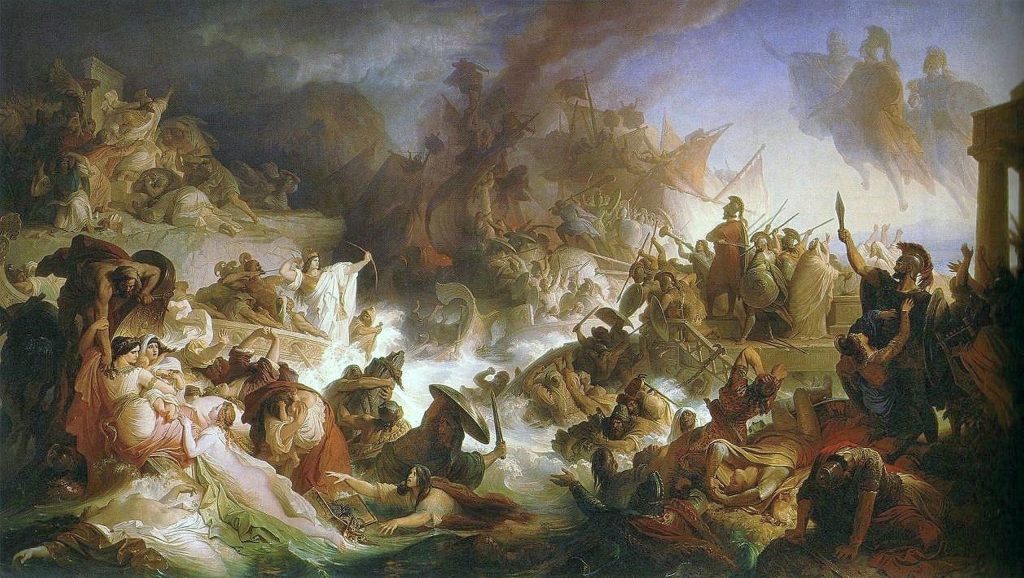
Die Seeschlacht bei Salamis (The Naval Battle at Salamis), Wilhelm von Kaulbach, 1868.
The extent to which Sparta was militarized is still hotly debated. There is no doubt that a large part of Spartan society was dedicated to military service and training, but there is evidence to show that it was certainly not their only focus.
With that in mind, perhaps it is time for us to rethink the way we portray this ancient city-state… but that doesn’t mean I won’t be watching 300 anymore.
Resources:
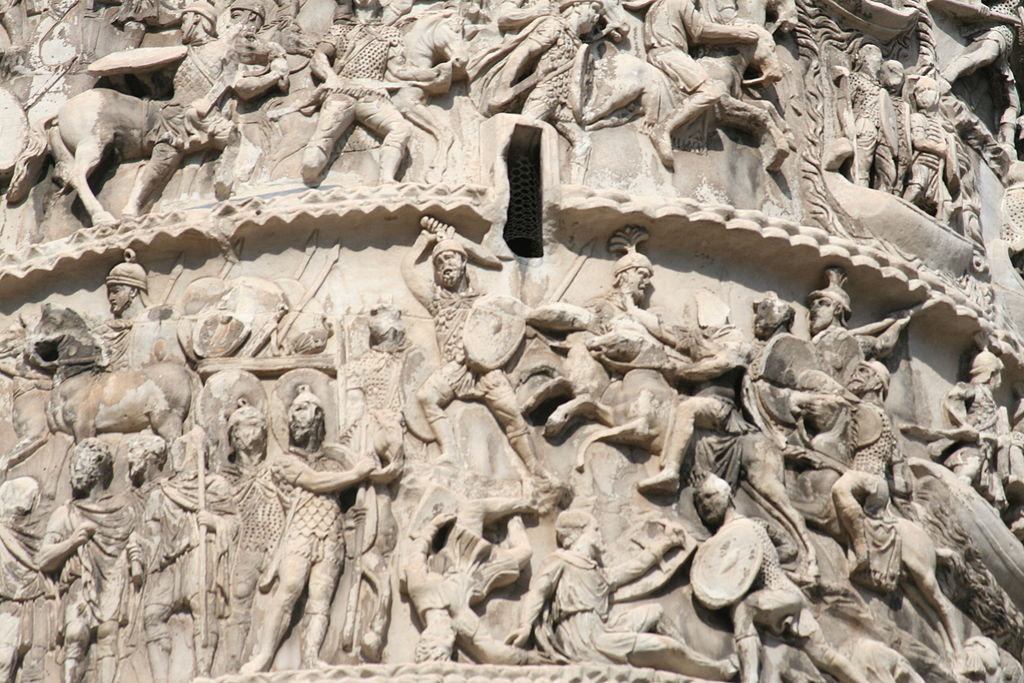
Thucydides, the ancient Greek historian and general, is most famous for his narrative of the Peloponnesian War (431–404 BC). The war was a struggle between Athens and Sparta and led to all-out war between the Greek city states as they sided with one or the other.
Thucydides documented not only the military and political decisions that were decisive during the war, but in so doing captured the darkest depths of human nature itself. He closes his preface to The History of the Peloponnesian War with the following remark:
This history may not be the most delightful to hear, since there is no mythology in it. But those who want to look into the truth of what was done in the past—which, given the human condition, will recur in the future, either in the same fashion or nearly so—those readers will find this History valuable enough, as this was composed to be a lasting possession and not to be heard for a prize at the moment of a contest.
Indeed, it is not the most delightful history to hear, not simply because there is no mythology in it, but because the violence carried out upon Greeks by fellow Greeks is so vicious and reflects all too well the violence held just beneath the surface within us today.
Yet, if such violence is part of our condition, part of our very nature, then we would do well to listen closely to the stories Thucydides passes onto us, so that we might avoid their recurrence.
Through the course of his narrative of the Peloponnesian War, Thucydides shows again and again that human beings are motivated primarily by fear, ambition, self-advantage, and a desire to rule over others. He sees these motives at play throughout the war between Athens and Lacedaemon (area of ancient Greece that comprised the city-state of Sparta), leading to some of the worst mistakes and injustices carried out on both sides.
Origins of the War
The origin of the war, according to Thucydides, was rooted in fear. Though the Lacedaemonians gave other reasons, Thucydides claims that fear was the underlying motive. As he put it, “the growth of Athenian power… put fear into the Lacedaemonians and so compelled them into war.” This was also one of the reasons that other cities joined Sparta, “some out of the desire to be set free from their empire, and others for fear of falling under it.”
A similar analysis is made concerning the Athenian empire. The Athenian ambassadors at Sparta, after hearing the complaints against them by representatives from Corinth, Aegina, and Megara, make a speech of their own.
In this speech they claimed that, after taking the lead and finishing the war against the Persians (Greco-Persian Wars, 492-449 BCE), “we were compelled to develop our empire to its present strength by fear first of all, but also by ambition, and lastly for our own advantage.” They went on to say that, “If we have been overcome by three of the strongest motives—ambition, fear, and our own advantage—we have not been the first to do this. It has always been established that the weaker are held down by the stronger.”
The Athenians, despite the fear and anger aroused against them (as Master Yoda once put it, “Fear leads to anger”), claimed that they could not be accused of anything more than acting in accordance with the nature of things.
The Plague
In the second year of the war a plague struck Athens, one so terrible Thucydides describes it as “too severe for human nature.” With the spread of disease and desperation came lawlessness. The quick reversals of fortune, Thucydides claims, led men to dare “to do freely things they would have hidden before—things they never would have admitted they did for pleasure.” He continues, writing:
And so, because they thought their lives and their property were equally ephemeral, they justified seeking quick satisfaction in easy pleasures. As for doing what had been considered noble, no one was eager to take any further pains for this, because they thought it uncertain whether they should die or not before they achieved it. But the pleasure of the moment, and whatever contributed to that, were set up as standards of nobility and usefulness. No one was held back in awe, either by fear of the gods or by the laws of men: not by the gods, because men concluded it was all the same whether they worshipped or not, seeing that they all perished alike; and not by the law, because no one expected to live till he was tried and punished for his crimes. But they thought that a far greater sentence hung over their heads now, and that before this fell they had a reason to get some pleasure in life.
This is what Thucydides meant when he said the plague was too severe for human nature. The devastation wrought by the plague brought forth their true tendencies that, before then, had remained dormant, held down by fear of the gods and the laws of men.
These two checks on our true nature had been rendered powerless… what became feared most was death by plague. And this fear, along with our tendency to pursue our own advantage, led people to seek immediate satisfaction in base pleasures. The very things that had once been considered noble, Thucydides tells us, were abandoned for such base pleasures.
During the plague even the great citizens of Athens succumbed to these inner tendencies—tendencies that, in better times, lurk only beneath the surface.
The Corcyrean Civil War
The civil war that took place on Corcyra is another example of our inner tendencies being brought to the surface. This civil war was between Corcyrean democrats and oligarchs, the former sympathetic to Athens and the latter sympathetic to the Lacedaemonians.
Once again, all became permissible. As Thucydides tells us, “there was nothing people would not do, and more: fathers killed their sons; men were dragged out of the temples and then killed hard by; and some who were walled up in the temple of Dionysus died inside it.” In the same way that what was considered noble was flipped on its head during the plague, the valuations of actions and traits were reversed:
Ill-considered boldness was counted as loyal manliness; prudent hesitation was held to be cowardice in disguise, and moderation merely the cloak of an unmanly nature…In brief, a man was praised if he could commit some evil action before anyone else did, or if he could cheer on another person who had never meant to do such a thing.
How many of us have seen, in these divisive times, individuals praising what they once condemned? Defending actions they would otherwise find abhorrent? In our more reflective moments, have we not seen this within ourselves?

This copper engraving by Matthaus Merian depicts the Athenian naval victory near Corinth over the Corinthian and Spartan fleet around 430 B.C.E. Photograph by akg-images/Newscom
Thucydides goes on to tell us that family ties were trumped by party loyalty, piety was all but forgotten, and that those who tried to remain neutral were attacked from both sides. How could this happen? Thucydides explains:
The cause of all this was the desire to rule out of avarice and ambition, and the zeal for winning that proceeds from those two… And though [each party] pretended to serve the public in their speeches, they actually treated it as the prize for their competition; and striving by whatever means to win, both sides ventured on most horrible outrages and exacted even greater revenge, without any regard for justice or the public good.
Does this state of affairs sound at all familiar?
The War Within
The cause of the evils of war, according to Thucydides, is not war itself, but us. If we were other creatures with a different nature, perhaps war would not be so terrible, or not occur at all.
When he describes fear, ambition, self-advantage, and our desire to rule over others, as our natural tendencies, he is not saying that we always act from these motives. For him, these always lie within us but are brought to the surface by disastrous events or great periods of hardship:
In peace and prosperity, cities and private individuals alike are better minded because they are not plunged into the necessity of doing anything against their will; but war is a violent teacher: it gives most people impulses that are as bad as their situation when it takes away the easy supply of what they need for daily life.
William Tecumseh Sherman, that great general of the Union Army, made famous the phrase that “War is hell.” Albert Camus, in his Notebooks, jotted down the following: “We used to wonder where war lived, what it was that made it so vile. And now we realize that we know where it lives… inside ourselves.”
Thucydides would nod in agreement with both. What makes war hell is that it emanates from the hell within us, always waiting for the right to circumstances to unleash its fury. Or, as the Joker puts it in the Dark Knight,
You see, their morals, their code, it’s a bad joke. Dropped at the first sign of trouble. They’re only as good as the world allows them to be. I’ll show you. When the chips are down, these… these civilized people, they’ll eat each other.
Human nature is laid bare in the events Thucydides describes because they reveal to us our innermost tendencies, what lurks beneath the surface at all times. In the right conditions these tendencies stay beneath the surface but, when put under stress or hardship, they all too readily are unleashed and wreak the type of havoc witnessed during the Peloponnesian War. And, importantly for Thucydides, such events will always have these effects, to a greater or lesser degree, so long as human nature remains the same.